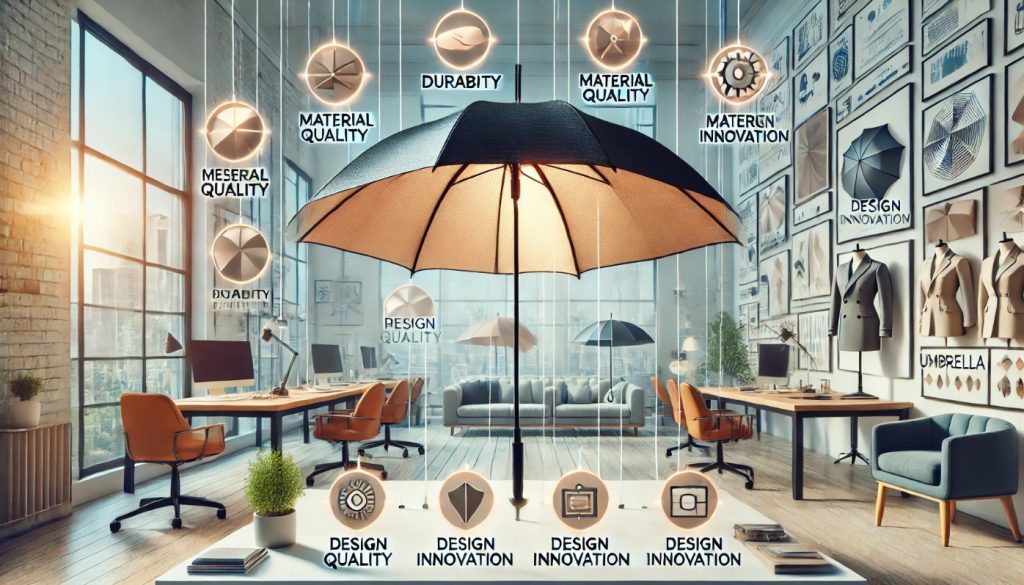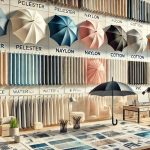When it comes to selecting an umbrella manufacturer, whether you’re a business looking to stock umbrellas for your customers or an individual seeking a durable, high-quality umbrella, there are several key factors to consider. The umbrella market is vast, with a wide array of manufacturers offering different levels of quality, design, and functionality. Selecting the right umbrella manufacturer is essential for ensuring the product meets your needs, lasts through tough conditions, and offers great value for money.
Understanding Your Requirements
Before diving into the process of selecting an umbrella manufacturer, it’s essential to first assess your specific needs. Knowing what you require from an umbrella will help guide your search for the right manufacturer.
Assessing the Type of Umbrella You Need
The type of umbrella you require will largely influence the manufacturer you choose. Umbrellas come in various styles, each suited for different uses:
- Compact Travel Umbrellas: Small, portable umbrellas that are easy to carry around and ideal for travel or daily use.
- Golf Umbrellas: Larger umbrellas designed to provide more coverage, perfect for golfers or individuals who need protection from both rain and sun.
- Fashion Umbrellas: Umbrellas that come in trendy designs or unique patterns for consumers who want both style and functionality.
- Heavy-Duty Umbrellas: Designed for industrial or commercial use, these umbrellas are built to withstand extreme weather conditions and are often used in outdoor events or by businesses.
- Promotional Umbrellas: Custom-branded umbrellas for businesses looking to advertise their logo and promote their brand through a practical item.
Understanding your specific need will allow you to focus on manufacturers that specialize in that particular type of umbrella, ensuring you get the best possible quality and design.
Defining Budget and Quantity
The budget you have for your umbrella purchase is another critical factor. Some manufacturers specialize in producing premium, high-end umbrellas that come with a higher price tag, while others may offer budget-friendly options. It’s important to have a clear understanding of your budget to ensure that you select a manufacturer whose pricing aligns with your financial parameters. Additionally, the quantity you require will also affect your choice, as some manufacturers are better equipped for large bulk orders, while others focus on smaller-scale production.
Quality and Durability
One of the most important factors to consider when choosing an umbrella manufacturer is the quality and durability of their products. The quality of the materials used in the construction of the umbrella determines its performance, lifespan, and overall customer satisfaction.
Material Quality
The quality of materials used in the manufacturing process directly affects the umbrella’s durability, strength, and reliability. High-quality materials ensure that your umbrella can withstand challenging weather conditions, such as heavy rain, strong winds, and UV exposure.
- Canopy Fabric: The fabric used for the umbrella canopy is crucial. Polyester and nylon are popular choices, but higher-end umbrellas may use materials like Teflon-coated fabric for better water resistance and UV protection. Some manufacturers may also offer eco-friendly options, such as recycled polyester or organic cotton.
- Frame Material: The frame supports the canopy, and it’s essential to choose a frame that’s lightweight but strong. Aluminum and fiberglass are commonly used due to their lightweight nature and resistance to rust. For industrial-grade umbrellas, steel frames are often used for added durability.
- Handle Materials: The handle should be both ergonomic and durable. Plastic, wood, and rubber are common handle materials, each offering different comfort levels and aesthetic appeal. A sturdy, well-crafted handle is crucial, especially in wind-resistant models.
- Ribs and Stays: These components are crucial for the structural integrity of the umbrella. Materials like fiberglass and steel are commonly used, with fiberglass offering a more flexible, wind-resistant option, while steel is sturdier but can be prone to rust.
Testing for Durability
Beyond material quality, testing for durability is vital. Manufacturers should be able to demonstrate that their umbrellas can handle various weather conditions. Some manufacturers go above and beyond to test their umbrellas for strength and performance:
- Wind Resistance: High-quality umbrellas should be tested to ensure they can withstand gusts of wind without turning inside out or breaking. Some umbrellas come with a windproof design or double-canopy technology to reduce wind resistance.
- Water Resistance: The ability of the umbrella to shed water quickly is also essential. This can be determined by the material’s water-repellent coating and the stitching used in its construction.
- UV Protection: Many modern umbrellas now offer UV protection. This is particularly important for customers who want protection from the sun as well as the rain. UV-protective coatings can prevent harmful UV rays from penetrating the canopy, making the umbrella more versatile.
Reliability of Manufacturing Process
The reliability of the manufacturer’s process is another critical component to consider. A manufacturer that has consistent quality control standards and effective production methods is more likely to deliver umbrellas that perform well over time. Look for manufacturers that have been in business for a significant period and have established a track record of delivering high-quality products.
Design and Customization Options
Another key factor to consider when choosing an umbrella manufacturer is the range of designs and customization options they offer. Whether you’re looking for a personal umbrella or umbrellas for promotional purposes, the design plays an important role.
Product Design and Innovation
The design of the umbrella affects both its functionality and its visual appeal. Some manufacturers offer a wide range of design options, including:
- Classic and Traditional Designs: For customers who prefer simplicity, many manufacturers offer traditional umbrella designs with basic colors and patterns.
- Stylish and Fashion-Forward Umbrellas: High-end manufacturers often create umbrellas that are not only functional but stylish, offering unique prints, colors, and materials.
- Ergonomic Features: Some modern umbrella designs include ergonomic handles, automatic opening and closing mechanisms, and compact designs that make them easier to carry and use.
- Wind-Resistant and Specialized Designs: For those in areas prone to strong winds, manufacturers who specialize in wind-resistant designs are crucial. These umbrellas might feature double canopies, reinforced ribs, and specialized frames to reduce the chance of turning inside out.
Customization Options
If you’re a business or looking for a personalized umbrella, customization options are essential. Many umbrella manufacturers offer the ability to customize the color, logo, and design of the umbrella to suit your specific needs.
- Logo Printing: Custom printing on the canopy, handle, or sleeve allows businesses to use umbrellas as promotional tools. High-quality printing methods such as screen printing or heat transfer printing ensure that the branding remains intact and visible for the long term.
- Design Customization: Some manufacturers offer the option to create unique, one-of-a-kind designs that reflect the preferences or brand identity of the customer. Whether it’s a custom color scheme, pattern, or a fully bespoke umbrella design, the ability to customize your umbrella adds personal value.
- Functionality Customization: For clients with specific needs, certain manufacturers may offer options to customize the umbrella’s functionality, such as adding an auto-open feature or creating larger canopies for more coverage.
Manufacturing Capabilities
The manufacturing capabilities of an umbrella manufacturer are a critical factor in ensuring that you receive your umbrellas on time and in the required quantities. The capacity of the manufacturer’s production lines, the efficiency of their process, and their ability to meet deadlines should all be considered.
Production Capacity and Scalability
Some umbrella manufacturers are more suited for large-scale orders, while others focus on small-batch or custom production. It’s important to evaluate the manufacturer’s capacity to meet your needs, especially if you are placing a bulk order.
- Large Orders: If you need to order large quantities of umbrellas, choosing a manufacturer with the infrastructure to handle big production runs is essential. Look for manufacturers who have automated production processes, allowing them to produce umbrellas efficiently without sacrificing quality.
- Small Orders and Customization: For smaller orders or highly personalized umbrellas, consider a manufacturer with flexible production capabilities. Some manufacturers focus on small batches, offering more creative freedom in design and customization.
Lead Times and Delivery
A good umbrella manufacturer should be able to provide clear and accurate lead times for your orders. Whether you’re purchasing a bulk order for an event or need personalized umbrellas for a campaign, understanding delivery timelines is essential for planning.
- On-Time Delivery: Ensure that the manufacturer can meet your delivery deadlines. Delays can affect promotional events or product launches, so it’s important to establish clear communication regarding timelines and expectations.
- Shipping Capabilities: If you’re ordering from overseas, consider a manufacturer’s ability to ship internationally and their partnerships with reliable logistics companies. Good manufacturers will offer a seamless shipping process and clear information about shipping costs, duties, and timelines.
Sustainability and Ethical Practices
As global awareness of environmental and ethical issues increases, many consumers and businesses now prioritize sustainability when selecting manufacturers. Choosing a manufacturer who adheres to eco-friendly practices can positively impact your brand’s reputation and reduce your environmental footprint.
Sustainable Materials and Processes
Look for manufacturers who use environmentally friendly materials in the production of their umbrellas. This can include:
- Recycled Materials: Some umbrella manufacturers use recycled fabrics, plastic, and other materials in their production process to reduce waste and minimize the use of virgin resources.
- Eco-Friendly Packaging: Sustainable packaging is an important factor. Manufacturers who use recyclable or biodegradable packaging materials help reduce the environmental impact of their products.
- Ethical Manufacturing: Consider the labor practices and working conditions of the manufacturer’s facilities. Ethical production practices ensure that workers are treated fairly and that products are made under safe conditions.
Certifications and Standards
Some umbrella manufacturers may have certifications or affiliations with organizations that promote sustainable or ethical business practices. Look for manufacturers with certifications such as:
- ISO 14001: A certification for environmental management systems, demonstrating that the manufacturer meets international standards for environmental sustainability.
- Fair Trade Certifications: Fair Trade ensures that workers involved in the production process receive fair wages and work in safe conditions.
- Global Recycled Standard (GRS): A certification that guarantees the use of recycled materials in the production of goods.
Customer Service and Support
Finally, customer service is a crucial aspect of selecting an umbrella manufacturer. Whether you have questions about the manufacturing process, need assistance with customization, or require support after your purchase, a responsive and helpful customer service team can make the entire process smoother.
Communication and Responsiveness
Look for manufacturers who provide clear communication throughout the ordering process. Whether it’s via email, phone, or live chat, having a reliable point of contact ensures that any questions or issues are addressed promptly.
After-Sales Support
Good manufacturers offer strong after-sales support, including warranties and return policies. If you receive defective products or encounter issues with your umbrellas, it’s important to choose a manufacturer that will work with you to resolve any problems efficiently.
Conclusion
Choosing the right umbrella manufacturer involves evaluating a variety of factors, including material quality, design options, manufacturing capabilities, sustainability practices, and customer service. By understanding your requirements and carefully assessing potential manufacturers, you can ensure that you select a partner who meets your needs, provides high-quality products, and supports your goals—whether you’re purchasing personal umbrellas or looking for bulk or promotional items.







